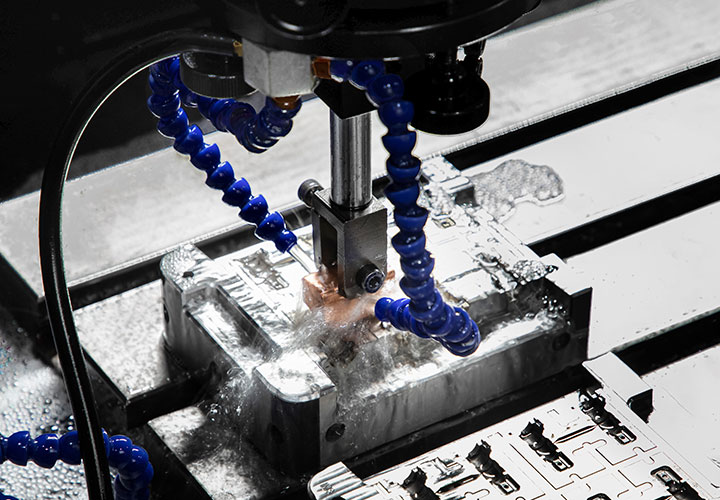Introduction
In the intricate manufacturing world, precision injection mold making plays a pivotal role in shaping the quality and consistency of end products. For companies seeking the highest standards in their production processes, understanding the nuances of precision is paramount. In this article, we delve into critical considerations, common challenges, and the crucial role of inspection technologies in achieving strict tolerances.

Critical Considerations in Precision Injection Mold Making
Precision injection mold making is more than a process—it’s a commitment to exacting standards. The journey begins with a comprehensive understanding of the precision requirements inherent in mold manufacturing. Each mold, crafted with precision, directly influences the final product’s quality and performance.
Manufacturers must carefully consider material selection, cooling systems, and microscopic precision. These elements collectively contribute to the mold’s ability to meet and exceed the stringent requirements of modern production.
Common Challenges in Precision Injection Mold Production
As precision injection mold-making advances, it brings with it a set of challenges that demand careful consideration. Mold manufacturing companies often grapple with complexities arising from the diverse materials used in molds, intricate cooling system designs, and the need for microscopic precision.
Materials Selection:
Choosing the suitable materials is a critical aspect of precision mold making. Mold manufacturing companies must navigate through many materials, each with unique properties. The challenge lies in selecting materials that meet the mechanical requirements and ensure longevity and stability during the injection molding process.
Cooling Systems:
Efficient cooling systems are indispensable for maintaining the desired precision in mold making. Designing intricate cooling channels to regulate temperature uniformly throughout the mold poses a significant challenge. Any deviation in temperature can affect the final product’s quality and consistency.
Microscopic Precision:
Meeting micro-level precision requirements is a demanding aspect of precision injection mold making. Mold manufacturing companies must employ advanced technologies and techniques to ensure that every detail is accurately replicated in the mold, no matter how minuscule.
The upcoming section will explore how innovative inspection technologies address these challenges and ensure conformance to strict tolerances in precision injection mold production. Stay tuned for insights into the cutting-edge solutions that define the landscape of mold manufacturing.
Inspection Technologies for Tolerance Conformance
In precision injection mold making, ensuring strict tolerances is a multifaceted challenge. Mold manufacturing companies leverage advanced inspection technologies to guarantee the precision and quality of their molds. Let’s explore some of these cutting-edge technologies:
1. 3D Scanning Technology:
- How It Works: Utilizing laser or structured light, 3D scanning captures the physical geometry of the mold with exceptional accuracy.
- Benefits: Enables detailed analysis of the mold’s surface, ensuring conformity to design specifications.
2. Coordinate Measuring Machines (CMMs):
- How They Work: CMMs use probes to measure the physical dimensions of a mold, providing precise data on size, shape, and position.
- Benefits: Offers high accuracy and repeatability, essential for meeting strict tolerances.
3. Optical Comparator Systems:
- How They Work: Optical comparators use lenses and projectors to magnify and compare the mold features with design specifications.
- Benefits: Ideal for inspecting intricate details and ensuring dimensional accuracy.
4. Automated Vision Inspection Systems:
- How They Work: These systems use cameras and computer algorithms to inspect molds for defects and deviations.
- Benefits: Enhances speed and efficiency in the inspection process while maintaining high accuracy.
These technologies empower mold manufacturing companies to assess every aspect of the injection mold precisely, ensuring it aligns seamlessly with the design specifications. Incorporating these inspection methods minimizes the risk of defects and enhances overall manufacturing efficiency.
Industry Standards and Best Practices
In precision injection mold making, adherence to international standards and best practices is instrumental in achieving consistent quality and reliability. Mold manufacturing companies that aim for excellence often align their processes with established benchmarks. Let’s delve into the critical aspects of industry standards and best practices:
1. ISO 9001 Certification:
- Significance: ISO 9001 is a globally recognized quality management standard that outlines the criteria for a quality management system.
- Impact: Attaining ISO 9001 certification demonstrates a commitment to quality, efficiency, and customer satisfaction.
2. Design for Manufacturability (DFM):
- Significance: DFM emphasizes designing products to optimize the manufacturing process.
- Impact: Applying DFM principles ensures that the injection mold is precise, cost-effective, and efficient to produce.
3. Continuous Improvement Practices:
- Significance: Embracing a culture of continuous improvement involves regularly evaluating and refining manufacturing processes.
- Impact: Companies prioritizing continuous improvement stay agile, adapting to new technologies and methodologies for enhanced precision and efficiency.
4. Risk Management Protocols:
- Significance: Establishing protocols for identifying and mitigating risks in the mold manufacturing process.
- Impact: Proactive risk management minimizes the likelihood of defects and ensures the consistent production of high-quality molds.
Mold manufacturing companies can establish a robust foundation for precision injection mold making by integrating these industry standards and best practices into their operations. In the following section, we will address common concerns that customers may have when seeking precision injection mold-making services. Stay tuned for insights into how mold manufacturing companies can address these concerns and build strong client partnerships.
Addressing Customer Concerns
As mold manufacturing companies strive to provide top-tier precision injection mold-making services, addressing customer concerns becomes crucial to building trust and fostering lasting partnerships. Here, we tackle some common questions and concerns that customers may have when seeking precision injection mold-making services:
1. Cost Considerations:
- Customer Concern: How can we ensure cost-effectiveness without compromising precision?
- Expert Response: Precision injection mold making may involve upfront costs, but the long-term benefits, including reduced defects and increased efficiency, often outweigh the initial investment. Collaborative discussions on material selection and design optimizations can contribute to cost-effectiveness.
2. Lead Time:
- Customer Concern: What is the expected lead time for precision injection mold production?
- Expert Response: Lead time depends on complexity, materials, and design intricacies. Mold manufacturing companies can provide accurate timelines by thoroughly assessing these factors, ensuring realistic expectations.
3. Quality Assurance Protocols:
- Customer Concern: How can we be confident in the quality of precision injection molds?
- Expert Response: Rigorous adherence to international standards, continuous improvement practices, and integrating of advanced inspection technologies are critical quality assurance indicators. Companies with ISO 9001 certification are particularly committed to maintaining high-quality standards.
4. Customization Options:
- Customer Concern: Can precision injection molds be customized to meet project requirements?
- Expert Response: Mold manufacturing companies can tailor precision injection molds to meet unique project specifications. Collaboration with clients during the design phase ensures that the mold aligns perfectly with their needs.
Benefits of Precision Injection Mold Making
Precision injection mold making offers many benefits beyond the manufacturing process, impacting the overall efficiency and quality of end products. Mold manufacturing companies that prioritize precision experience the following advantages:
1. Enhanced Product Quality:
- Precision molds ensure the accurate replication of intricate details, leading to products with consistent quality and minimal defects.
2. Improved Production Efficiency:
- Well-crafted precision molds contribute to smoother injection molding processes, reducing cycle times and increasing production efficiency.
3. Cost Savings Over the Long Term:
- While precision injection mold making may involve initial investments, the long-term benefits include reduced defects, less material waste, and increased operational efficiency, resulting in significant cost savings.
4. Consistency in Output:
- Strict tolerances achieved through precision mold-making guarantee consistency in the dimensions and features of each produced item.
5. Extended Tooling Lifespan:
- Precision molds, when crafted with durability in mind, have a longer lifespan, providing sustained value for manufacturers.
Future Trends and Innovations
As technology advances, the landscape of precision injection mold-making is evolving. Here are some emerging trends and innovations that mold manufacturing companies are integrating into their processes:
1. Additive Manufacturing for Molds:
- Utilizing 3D printing technologies to create intricate mold designs with reduced lead times and enhanced customization options.
2. Smart Manufacturing:
- Implementing IoT devices and sensors to monitor and optimize the injection molding process in real-time for increased efficiency.
3. Sustainable Materials:
- Exploring eco-friendly and recyclable materials for precision injection molds to align with the growing demand for sustainable manufacturing practices.
4. Artificial Intelligence in Quality Control:
- Integrating AI algorithms for real-time manufacturing data analysis ensures even higher precision and quality control.
In conclusion, precision injection mold making is not just a process—it’s a strategic investment that yields a spectrum of benefits, from elevated product quality to long-term cost savings. Embracing future trends and innovations ensures that mold manufacturing companies stay at the forefront of delivering excellence in the ever-evolving manufacturing landscape.
For companies seeking precision injection mold-making services that go beyond expectations, our team is ready to collaborate and elevate your manufacturing processes. Explore the possibilities and unlock the potential of precision in every mold.
